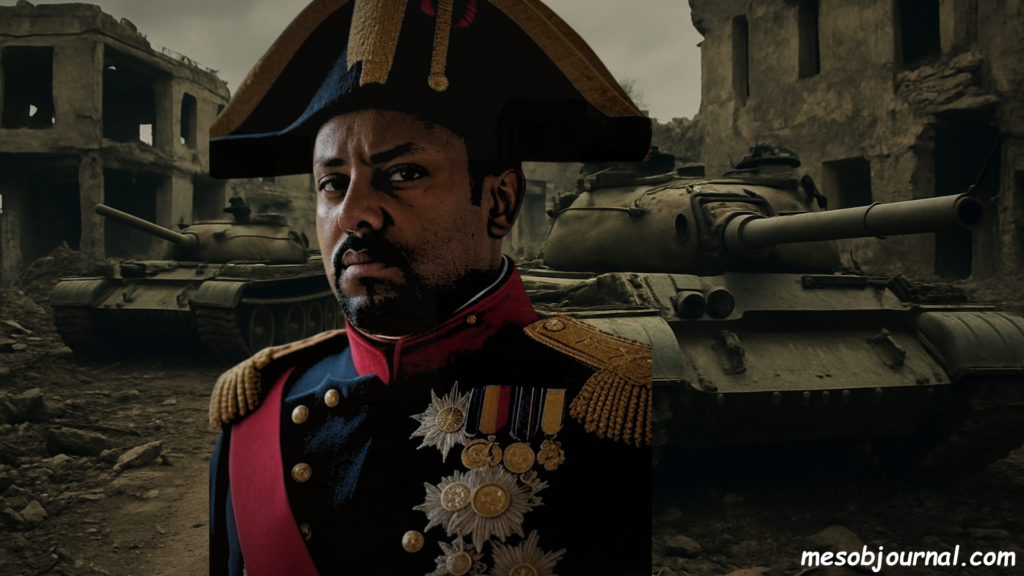Ethiopia–Eritrea: Lies, Diversions, and the Abyss Ahead

There’s an old Eritrean saying: “The sling utters a shrill cry while hitting its prey.” This is the essence of Ethiopia’s latest campaign against Eritrea – a shrill, dishonest cry to conceal an act of provocation.
At a time when Ethiopia teeters under the weight of its own failures, the regime in Addis Ababa is pointing fingers outward, desperately inventing enemies to mask its internal collapse. Eritrea, yet again, is the convenient scapegoat.
In the July 2025 interview, President Isaias Afwerki dissected these tactics with precision – and disdain. “These statements are infantile and difficult to fathom,” he said bluntly. “One wouldn’t expect even a child to speak in such a way.” He was referring to the Ethiopian government’s official accusations, sent in letters to the UN Secretary-General and world leaders, falsely claiming Eritrean provocation and preparations for war.
Let’s be clear: Eritrea has made no such preparations. But Ethiopia has.
Behind the media smokescreen, the Prosperity Party is stockpiling weapons, recruiting militias, drawing imaginary war plans involving drones, pincer assaults, and missile deployments. There are whispers of operations to seize Assab, infiltrate Gash-Barka, and open new fronts via Sudan. These aren’t Eritrean delusions. They’re statements made by Ethiopian officials, broadcast in Ethiopia’s own media.
And all of it—every inch of it—is a diversion.
Ethiopia is burning, not because of Eritrea, but because of internal contradictions. The euphoria that once surrounded Prime Minister Abiy Ahmed has given way to disillusionment, despair, and now desperation. The Pretoria Agreement – which was supposed to end the civil war – remains largely unimplemented. Worse, the shocking betrayal of the very Amhara forces that saved his government from the TPLF has ignited a new and devastating war.
Meanwhile, Oromia remains volatile, and the economy is spiraling. When a regime loses control of the narrative, it manufactures enemies.
Hence, Eritrea.
“The current challenges in Ethiopia defy simple descriptions,” said President Isaias. But one thing is certain: Eritrea did not start this fire. And it will not fan the flames. “We are not really perturbed,” he added calmly. “We should not be derailed. We need to move forward along the path we have charted.”
That path is principled restraint – paired with relentless vigilance.
In the interview, President Isaias exposed the deeper architecture behind these diversions: “This is not directed at Eritrea only,” he warned. “It affects all the peoples in Ethiopia.” The propaganda claiming Eritrea is siding with Tigray or Amhara is not just false – it is dangerous.
It seeks to pit communities against each other, to sow suspicion and prepare public opinion for conflict. The script is old: invent an external threat, silence internal dissent, and tighten your grip.
But even more troubling is the foreign hand behind these schemes. “This is not Ethiopia’s agenda,” President Isaias explained. “It has recently resurfaced by new, self-proclaimed hegemons with their own agendas.” He was speaking, in no uncertain terms, about the UAE President and his quest to control the Red Sea corridor – an ambition stretching from the Suez Canal to Dar es Salaam.
According to the interview, Eritrea was offered a deal: half of Djibouti’s port revenues—if it allowed Ethiopia to bypass Djibouti entirely and use Assab. Eritrea refused. It considers such behavior immoral and destabilizing. Unlike others, Eritrea will not sabotage a neighbor for profit.
The current Ethiopian regime, however, has shown no such scruples. From Somaliland to Sudan, its fingerprints are increasingly found on crises. And behind it, UAE money flows like a river – buying influence, peddling chaos, and pushing Eritrea into a corner it never volunteered to enter.
“We have no interest, whatsoever, in waging war,” President Isaias reiterated. “But if war is imposed upon us, there is no option but to confront it.” Eritrea does not speak in riddles. It does not bluff. And it has no time for the infantile psychology of drone-and-missile fantasies. “Can any rational person contemplate these war plans?” he asked. “It is, quite frankly, childish.”
The rhetoric coming out of Addis Ababa – boasts of 130 million people “overwhelming” Eritrea by sheer numbers – is not just arrogant. It’s suicidal. “Whom do you intend to intimidate with such rhetoric?” President Isaias asked rhetorically. “What do they intend to achieve with wave attacks?”
The implication is sobering: this is not about military doctrine. It is about delusion.
Yet Eritrea refuses to take the bait. It will not be provoked into a war it did not start. It will not dignify fiction with escalation. But it is not asleep either. It is watching. It is preparing – not for aggression – but for defense, and for regional stabilization in the wake of Addis Ababa’s implosion.
Because this crisis is not just about Ethiopia and Eritrea. As President Isaias noted, “It is an issue that affects the wider region as a whole – Somalia, Kenya, South Sudan, Sudan, and other Red Sea countries.” The destabilization campaign has tentacles, stretching across capitals and corridors, fueled by money and ambition – but blind to consequence.
The only antidote to this madness is truth. And clarity. And resistance to manipulation.
Once again, Eritrea finds itself maligned for refusing to play by imperial rules. Once again, it is slandered for its strength. But as always, its silence is not weakness – it is moral superiority. And when the smoke clears, as it always does, Eritrea’s stance will stand vindicated.

